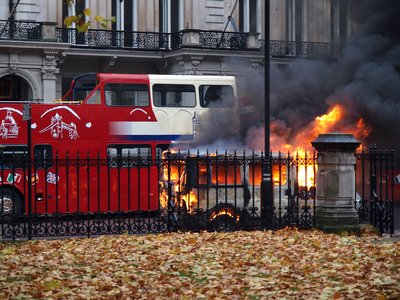There was also a large drop in the number of fire-related fatalities and a modest fall in false alarms.
Here are the key figures from the report:
- FRAs attended 487,400 fires or false alarms in Britain in 2012/13, 17% fewer than in 2011/12
- More than one third of fires occurred in dwellings with no alarm installed
- In 2012-13, there were 350 fire-related deaths, 47 fewer than in 2011/12 and fewer than in any year in the last 50 years, falling from its peak of 967 in 1985/86
- Crews attended a total of 192,600 fires in 2012/13, 29% fewer than in the previous year. Almost two thirds (62%) of these were outdoor fires, with refuse, road vehicles, grassland and heathland among the materials to ignite. Over one fifth (22%) were dwelling fires, 6% down compared to 2011/12.
- The number of false alarms fell by 6% to 294,800 from 313,300 in 2011/12
- Three quarters of fire-related fatalities occurred in dwelling fires, a fall of 11% (32 deaths) compared to 2011/12
- Most deaths in dwelling fires were caused by smoker’s materials, while cooking appliances were the source of ignition in more than half of fires in dwellings
- Scotland continues to have a higher rate of fire deaths than both England and Wales
Do not delay in calling 999, says LFB
A new report from the London Fire Brigade (LFB) on incident response times, Fire Facts, has revealed that delay in dialling 999 is causing the majority of fire deaths in London. In 40% of incidents in the capital the fire service was not called until more than 10 minutes after the start of a fire – these incidents accounted for 70% of all fire deaths. The report also shows that:
- Nearly half of those seriously injured by fire had not contacted the Brigade soon enough
- Control officers took an average 1 and a half seconds to deal with a 999 call, three times faster than in 2007
- In the last five years, firefighters have shaved nearly a minute off the time taken to get out of the station after the bells have sounded.
Send the fire service a text?
In a pilot project in the US, citizens can send texts to 911 to notify police and fire departments of an emergency situation. Call centres have been specially equipped to receive such texts in a number of primarily rural areas, with full roll-outs in two states.
A similar scheme, Emergency SMS, has been in use in the UK since early last year, over 32,000 mobile phones having been registered by May 2012.
Texts are spoken to 999 controllers once people have registered their phones. The service warns, however, that texts will take longer to get a response than calling, and should only be used to call the emergency services when there is no other option, or when people have a speech impairment or hearing loss.
Fires caused by chargers
Avon FRS have reported 19 fires in the Bath and Bristol area alone caused by mobile phone and laptop chargers in the last eight years.
One such blaze started by a phone charger e in Paulton led to the death of a 63-year-old man, an inquest heard. Avon FRS advised the public not to overcharge their devices, especially at night, never to cover them and not to use cheaper, unbranded, chargers without the CE mark. There have been a number of fatalities in England where phone chargers have been the suspected cause.
Dreamliner fire cause confirmed
Incorrectly installed battery wiring was the likely cause of the fire in the Ethiopian Airlines Boeing 787 parked at Heathrow Airport in July 2013.
The safety body UK Air Accidents Investigation Branch (AAIB) reported extensive heat damage in the upper portion of the aircraft’s rear fuselage, particularly in an area near the emergency locator transmitter (ELT). This led the investigators to conclude that the fire originated within the ELT battery, believing that the battery had been installed incorrectly, with crossed wires pinched between the device case and the coverplate, causing a short circuit.
2023 Fire Safety eBook – Grab your free copy!
Download the Fire Safety in 2023 eBook, keeping you up to date with the biggest news and prosecution stories from around the industry. Chapters include important updates such as the Fire Safety (England) Regulations 2022 and an overview of the new British Standard for the digital management of fire safety information.
Plus, we explore the growing risks of lithium-ion battery fires and hear from experts in disability evacuation and social housing.


